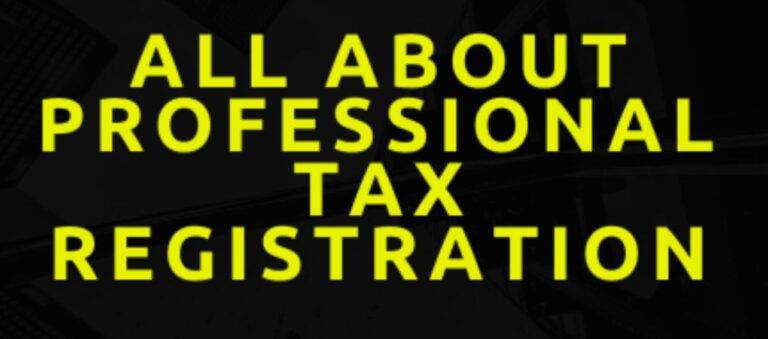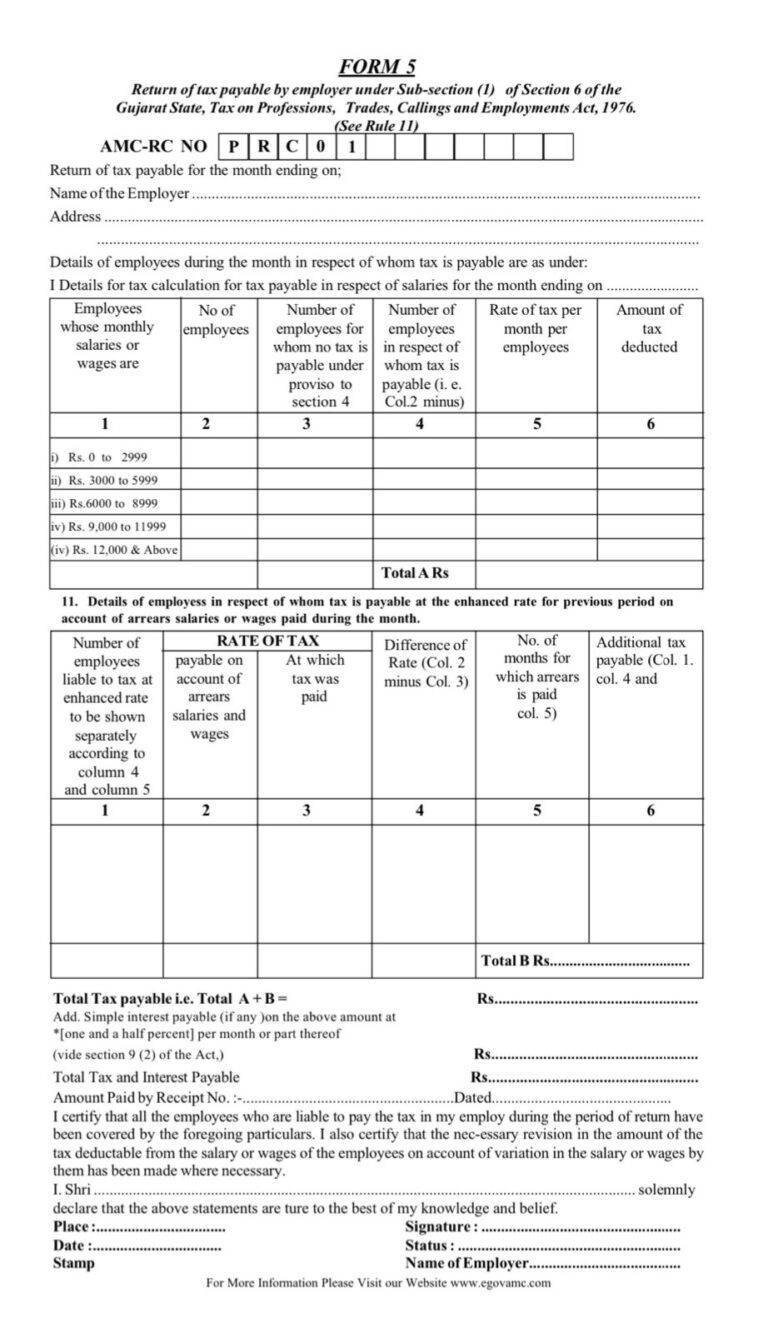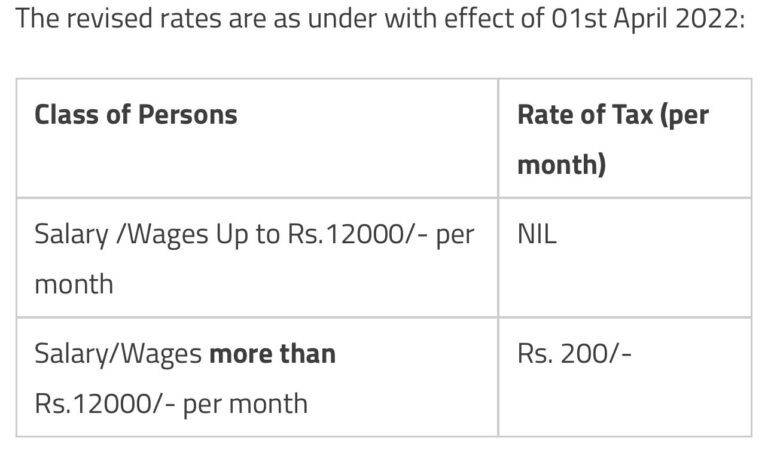Professional tax registration services
Call Us Today +91 80000 57972
Professional Tax in Gujarat: Everything Explained - People who receive a salary in Gujarat are familiar with the concept of "professional tax". This term doesn't only apply to salaried people but to all individuals who earn an income. Therefore, all people who earn money should have a thorough understanding of professional tax in Gujarat. Go through the following sections to understand the meaning of professional tax, payment process and all related information!

What Is Professional Tax in Gujarat?
The Government of Gujarat imposes a professional tax on individuals and employees involved in various professions who generate income through trades, professions, or employment.
The Gujarat State Tax on Professions, Trades, Callings and Employment Act, 1976, was implemented with the purpose of levying a tax on various professions, trades, callings, and employments.
Read the following table to learn about the current professional tax slab in Gujarat.
Income of Taxpayer (Monthly) | Payable Professional Tax Amount (Monthly) |
Employees earning up to ₹ 5,999 | Nil |
Employees earning between ₹ 6,000 to ₹ 8,999 | ₹ 80 |
Employees earning between ₹ 9,000 to ₹ 11,999 | ₹ 150 |
Employees earning ₹ 12,000 or above | ₹ 200 |
Who Is Responsible for Collecting and Paying Professional Tax in Gujarat?
Different municipal corporations in Gujarat are collecting professional tax.
Salaried Individual: Salaried Individuals who are paid a salary are responsible for paying Professional Tax in Gujarat. The employer deducts the tax from the employee’s salary or income and pays it to the State Government of Gujarat.
Self-employed Individual: A self-employed individual who works independently is responsible for paying their own professional tax to the Gujarat State Government.
When Is the Due Date for Professional Tax Payment in Gujarat?
Professional taxes are paid or collected both monthly and quarterly. For companies with fewer than 20 staff/employees, the employer or business owner must make the payment within 15 days of the following month.
If a company has more than 20 employees, the employer or business owner should pay the PT in Gujarat every quarter before the 15th of the following month. It is important to note that payment must be made within 15 days after the end of the quarter.
Therefore, the due dates of quarterly professional tax payment in Gujarat are as follows,
15th July (for April to June quarter)
15th October (for July to September quarter)
15th January (for October to December quarter)
15th April (for January to March quarter)
If people do not pay their professional tax on time, they will be required to pay a penalty with an annual interest rate of 18% of the amount due, which is calculated daily.
What Is the Rule Regarding Professional Tax Exemption in Gujarat?
In Gujarat, Handicapped persons do not have to pay PT. However, they must present a disability certificate to qualify for this exemption.
Now that people have obtained important information regarding professional tax in Gujarat, they can quickly and easily transfer the same information to other municipal corporations.



Check out the best Professional tax registration services in Ahmedabad, India
Recent Posts
- Step-by-Step Process to Claim GST Refunds Efficiently
- Benefits of Regular Audits for Limited Liability Partnerships
- APEDA Registration Consultants in Ahmedabad: Expert Guidance for Exporters
- MIS Reporting Consultants in Ahmedabad: Expert Financial Insights for Business Growth
- NGO Registration Consultants in Ahmedabad: Expert Guidance for Trust, Society & Section 8 Company Formation
- Top Startup Consultants in Ahmedabad: Expert Guidance for Business Launch & Growth
- Startup Advisory Services in Ahmedabad: Complete Business Support for Startups & Founders
- One Person Company (OPC) Registration in Ahmedabad: Step-by-Step Guide, Fees & Legal Requirements
- Top 10 Reasons You Need a Chartered Accountant for Company Compliance in India
- Why Hiring a Chartered Accountant (CA) for Company Compliance is Critical: A Complete Guide for Indian Businesses
FAQS on Professional tax registration services
The professional tax number from the previous year can be located on the professional tax payment receipt or registration form.
Transmission is the process of transferring the ownership of shares from one person to another, without the involvement of the company’s registrar or transfer agent. In this process, the transferor is the one who transfers the shares and the transferee is the one who receives the shares.
The necessary paperwork required to pay Professional Tax in Gujarat includes evidence of the starting date of the business, information on employees, salary and payslip records, accounting statements, and proof of the address.
In Gujarat, registration for PT is mandatory. The respective payer must apply for a registration certificate and finalize the process within 30 days of hiring staff/employees. For multiple businesses, the registration process must be done separately.
The first group of people involved in the share transfer process are the shareholders. The shareholders are the individuals or entities that have ownership in the company. They are the ones who control the shares and decide who to transfer them to.
The second group of people involved in the share transfer process are the company’s directors. The directors are responsible for overseeing the transfer process and ensuring that all of the necessary steps are taken to complete the transfer.
The third group of people involved in the share transfer process are the brokers. The brokers are the people who facilitate the transfer from one party to another. They work with the shareholders and the company’s directors to make sure that the transfer is completed in a timely and efficient manner.
In Gujarat, Professional Tax can be obtained online from the State sales tax department website.
Parents of children with permanent or mental disabilities are not required to pay Professional Tax. Additionally, those serving in the State’s forces, including members of auxiliary forces or reservists, as defined in the Army Act, 1950, the Air Force Act, 1950, and the Navy Act, 1957, are also exempted.
